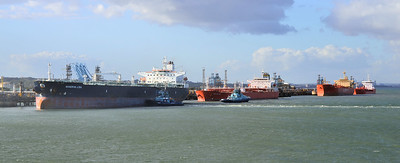“The ports are an environmental justice issue,” says Yifang Zhu, an air pollution expert at UCLA Fielding School of Public Health. “The nearby communities are exposed to so many pollutants from ships and trucks, and the effects are very clear.” Among them, more preventable lung and heart disease, an increased risk of diabetes, and higher cancer rates.
GIANT SHIPS LURKED off the California coast for weeks in April and May, their bellies full of up to 20 million barrels of oil. This floating cache, enough to support the energy needs of the entire U.S. for a day, sat aboard an idling fleet that pumped out tons of pollutants, according to a new analysis performed by the University of College London and shared with National Geographic. These emissions could ultimately affect the long-term health of coastal communities—many of them already at risk and underserved—and they added tons of climate-warming carbon dioxide to the atmosphere.
Despite U.S. energy demand plummeting to record lows due to the coronavirus crisis, oil kept getting pumped out of the ground. The resulting oversupply taxed the limits of U.S. storage capacity. Oil trade groups spoke of a scramble to fill up empty pipelines or rail cars, but the most popular option was to charter and fill giant oil tankers. These tankers and their sea-size loads of oil began idling a few miles offshore from major shipping centers around the world, including Los Angeles and Long Beach, California.
Written by Alejandra Borunda
Originally published June 12, 2020 at https://www.nationalgeographic.com/science/2020/06/coronavirus-oil-prices-crashed-tankers-idled-california-spewing-pollution/#close
Photo by Roger Marks.

